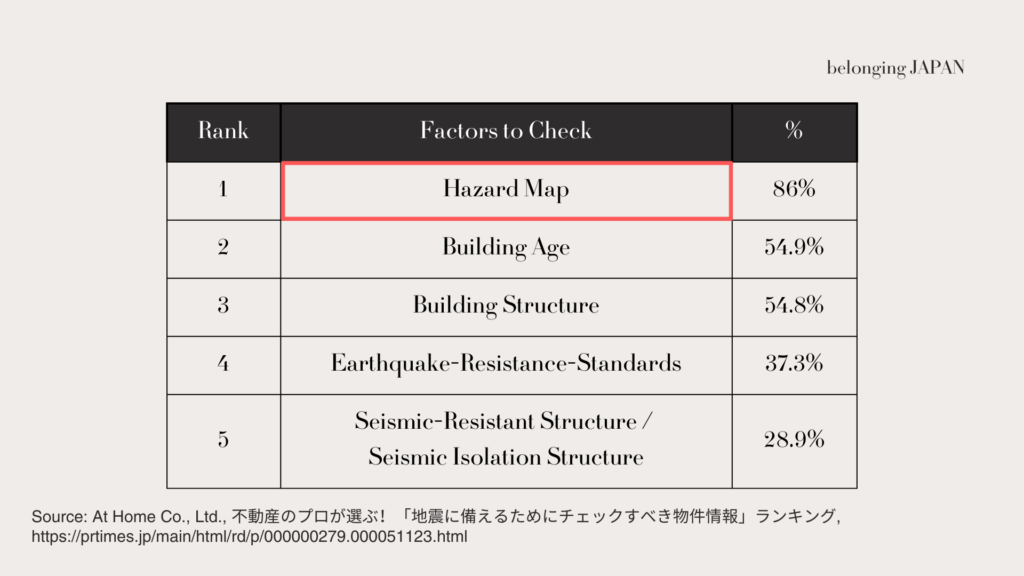When looking for a house, do you consider factors such as earthquakes and other disasters? The design of the house, its size, and the distance from the station are all important factors to take into account. In Japan, it is also important to consider disasters such as earthquakes. This article highlights the factors you might need to consider and check when you go for a viewing.
Table of Contents
Quick Video Guide
If you prefer watching a video, please refer to below, starting from 1:40.
Property information that should be checked for earthquake preparedness
The ranking presents the research findings conducted by At Home Co., Ltd., which is one of the renowned real estate information services in Japan. The survey was conducted among 1,016 nationwide At Home affiliated stores that have handled customers searching for rental residential properties. The purpose of the survey was to identify property information that should be checked for earthquake preparedness.

Hazard Map
According to their survey, over 86% of real estate companies have responded to hazard maps. It is emphasized that it’s important to check the location, considering factors such as the proximity of rivers or slopes to your house. Additionally, it is crucial to identify the location of evacuation shelters near the house. Comments also included, ‘It is recommended to confirm the route to your workplace and your children’s commuting paths. Checking for nearby places for evacuation in case of emergencies is essential.’
Regarding the initial point about location, for instance, in recent years, Japan has experienced frequent sudden heavy rainfalls. It might be advisable to check beforehand whether nearby rivers have flooded in the past or if there is a potential risk of landslides. Moreover, concerning evacuation shelters, schools might serve as shelters in some cases, and parks could become evacuation sites during disasters. Confirming these details in advance is also considered beneficial.
This is a “Hazard Map Portal Site” operated by the Ministry of Land, Infrastructure, Transport and Tourism of Japan. When you enter an address in Japanese, details about things to consider in that area are displayed. It might be worth taking a look.
Building Age
In second place was ‘building age,’ accounting for 54.9%. Comments from real estate companies included statements such as ‘investigating seismic standards based on the building age.
According to at home, the term ‘New Seismic Standards’ refers to the seismic standards applied since June 1, 1981. These standards aim to establish structural criteria that prevent collapse even during strong tremors with an intensity of approximately 6 to 7 on the seismic scale. It’s worth checking your real estates about the building age according to this.
Building Structure
In third place is ‘building structure (RC construction, SRC construction, wood construction, etc.).’ Comments from real estate companies included statements such as ‘RC construction and steel frame construction are preferred’ and ‘We recommend SRC construction.’ RC construction refers to reinforced concrete construction, while SRC construction refers to steel-frame reinforced concrete construction.
Conclusion
In summary, there are various factors you want to check when you are house hunting, such as price, location, and design. Since most locations in Japan might have a risk for disasters, including not only earthquakes but also heavy rain, typhoons, etc., priorities may differ among individuals. However, for you and your family’s safety, incorporating these insights into your decision-making process is worthwhile.


